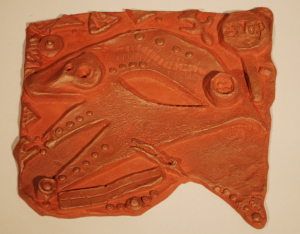When compiling resources for Women’s History Month, in a country where reproductive rights and gender justice initiatives are in grave peril, I found it necessary to highlight numerous strands of interrelated histories. The socialist origins of International Women’s Day, and the role of Jewish immigrants who later fell victim to state repression and genocide, are just two legacies informing contemporary feminist and gender-based activism.
Crucially as a Center for Holocaust and Genocide Studies, we must also confront how gender always dictates the lived experience of victims and survivors of mass violence, both during the events in question and following. We are painfully aware of the ways individuals become targets in specific ways due to their gender. Furthermore, political decisions and humanitarian relief often fail to take gender into account, keeping women, genderqueer, and other non-male-identifying individuals away from negotiation tables and policy action.
As activists both past and present push for equal rights across gender identities, while repressive regimes around the world continue to curb various rights with frightening success, it is important to understand how equal representation and a working understanding of gender justice are vital to memory politics.
Below are links from the Center’s webpages, as well as third-party resources we encourage you to consult.
Materials from the Center’s Archive:
- The portraits and interviews with artist Oscar De La Concha include:
- Voice to Vision, a collaborative project that captures the experiences of genocide survivors, victims of mass violence, as well as their descendants. Subjects (in dialogue with project participants) use oral testimonies to collaboratively create mixed media artworks.
- Voice to Vision Series V centers survivors of gender-based violence; also features survivors of the Cambodian Genocide; Genocide of Indigenous Peoples; the Holocaust; Rwandan Genocide and Sudanese Civil War
- In Voice to Vision Series VI highlights the lives of descendants of genocide survivors
- Voice to Vision Series XVII features Professor Brenda Child, and Professor Child’s daughter, Benay McNamara, interweaving personal and collective stories that recount their family’s forced removal from Anishinaabe lands in 1889 by the Nelson Act

Armenian Genocide:
- The Shoah Foundation’s Visual History Archive contains approximately 600 interviews relating to the Armenian Genocide in a variety of languages covering various subjects; many have been fully indexed and are searchable through the Shoah Foundation’s website. The full database is available online to university users and the general public through on-site access in Wilson LIbrary (UMN West Bank)
Bosnia and Herzegovina – Massacres in Srebrenica and Visegrad:
- Facing History and Ourselves includes lesson plans and other materials including:
- Photography from Aftermath: Bosnia’s Long Road to Peace (from Facing History’s Aftermath Project)
Indigenous Peoples in North America
- Facing the Realities of Native American Women
- Library Guide developed by UMN Librarian Kat Nelsen with vital resources, particularly for American Indian Studies research
- Open Rivers Project – a multi-vocal journal publishing clear and accessible content within and beyond higher education
Jewish Life prior to and following the Holocaust:
- Irene Klepfisz, born in the Warsaw Ghetto, discusses with the Yiddish Book Center’s Wexler Oral History Project:
- “The History That’s Never Taught” (i.e., the role of women in Jewish cultural activism, a cultural activisism destroyed by genocide).
- As an out lesbian and ardent feminist, Klepfisz speaks to being a Jewish lesbian and feminist, and the queerness of contemporary Yiddish culture
Meyer Weinshel is a Ph.D. candidate in Germanic studies at the University of Minnesota Twin Cities, where he is the educational outreach and special collections coordinator for the UMN Center for Holocaust and Genocide Studies. In addition to being an instructor of German studies, he has also taught Yiddish coursework with Minneapolis-based Jewish Community Action and at the Ohio State University.

Comments